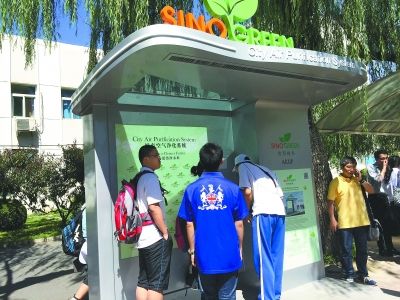Beijing Installs Standalone Outdoor Air Purifying Stations
Last week, a structure bearing similar resemblance to a bus stop was unveiled on Tsinghua campus. The object is in fact an air-purifying station worth about RMB 600,000 and has been jointly developed by Sino Group and Arup, a Hong Kong based real estate developer and a global design firm.
The station works like smaller, indoor units but on a much larger scale, drawing in air from the inlet located at the bottom, removing PM10 and PM 2.5 through a bag filter, and emitting the newly-purified air out through the vent overhead. The purifier is also equipped with a censor which connects to a central computer, enabling hourly comparisons of air quality data across units.

An anonymous official from Tsinghua University told Beijing News that "the air purifing station can purify air through filtration as well as improve roadside ventilation by generating air currents between buildings and roads." He believes that the air purifying station will be extraordinarily helpful in combating Beijing's air pollution fueled by the "street canyon effect," streets that are flanked on both sides by buildings are so are more susceptible to pollution buildup.
Before Tshinghua University, the station had been set up for a few months by Queen's Road East, one of the busiest strips in Hong Kong, and proved successful in eliminating pollutants in the nearby area. According to yahoo.com, when the station was turned on, an average 40 percent reduction in concentration of air pollutants was found, although the article does not define what is meant by "near the station," i.e. the machine's working range.
Another advantage of the station is its flexibility in design and application, allowing them to double as a bus or train shelter.
According to Beijing News, the city is considering utilizing more of these station across the city, depending on the effectiveness of the prototype station in Tsinghua. The next model is already in development, and will boast even more features such as automatic operating hours, solar panels, and a mist cooling system.
Although we are excited about the prospect of even cleaner air in Beijing, we are also slightly dubious about how effective the machines will be on a large scale and how useful they are as a short-term solution to a particularly long-term and complicated problem. What these stations will do is provide people a shelter for temporary rest and clean air, but will not reduce the city's general level of air pollution, which can only be tackled by controlling emissions.
More stories by this author here.
Email: patrickli@thebeijinger.com
WeChat: xinwurenli
Weibo: @lucky__strike
Photos: cri.cn, people.com
Comments
New comments are displayed first.Comments
![]() PatrickLi
Submitted by Guest on Tue, 07/07/2015 - 14:47 Permalink
PatrickLi
Submitted by Guest on Tue, 07/07/2015 - 14:47 Permalink
Re: Beijing Installs Standalone Outdoor Air Purifying Stations
@ andrew, The text has been corrected. Thank you.
@ guest, Previously the article incorrectly said that the price is RMB 6 million, which in fact is RMB 6 hundred thousand. This has been corrected. If you still want to comment, please find your old comment here for a rewrite. Sorry man.
My apologies. 
![]() PatrickLi
Submitted by Guest on Tue, 07/07/2015 - 11:17 Permalink
PatrickLi
Submitted by Guest on Tue, 07/07/2015 - 11:17 Permalink
Re: Beijing Installs Standalone Outdoor Air Purifying Stations
Agreed. These machines are nice but the return on investment would be extremely low if they are sold 600,000 kuai for one. The investment would also lead to a conceptual fallacy because we don't want cleaned air, we want clean air---so control the emissions.
I have a friend who got her master's at Hong Kong Chinese University with the "Advanced Environmental Planning Technology (AEPT)" program. She told me the whole program is a sham: reading junk quality environmental studies papers, attending environmental conferences with perceived importance, writing 100-page term papers that don't meet the humblest academic standard, and taking self-paid travelling programs to Taiwan, Japan, the US and Europe (I guess the professors just don't have time to lecture).
These graduate programs in Hong Kong are made recently to attract Mainland college graduates. Local Hongkongers very rarely go to graduate schools unless such a degree is mandatory for doing a certain job, like a physician or attorney. Almost 100% of the students and professors are from the mainland.
These mainland professors and students have a lot of connections within China. My friend told me that her program's chair hinted many times that he has a lot of connections and can write them recommendation letters and even get them jobs in Beijing if they impressed him.
![]() andrew_s
Submitted by Guest on Tue, 07/07/2015 - 10:48 Permalink
andrew_s
Submitted by Guest on Tue, 07/07/2015 - 10:48 Permalink
Re: Beijing Installs Standalone Outdoor Air Purifying Stations
I'm not sure I would refer to Arup as an air purifier manufacturer or Hong Kong based. They are the London design & engineering firm that built the Bird's Nest, remember?
Validate your mobile phone number to post comments.

